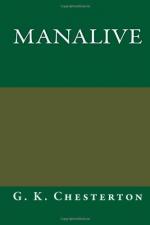Arthur Inglewood followed his old friend—or his new friend, for he did not very clearly know which he was. The face looked very like his old schoolfellow’s at one second and very unlike at another. And when Inglewood broke through his native politeness so far as to say suddenly, “Is your name Smith?” he received only the unenlightening reply, “Quite right; quite right. Very good. Excellent!” Which appeared to Inglewood, on reflection, rather the speech of a new-born babe accepting a name than of a grown-up man admitting one.
Despite these doubts about identity, the hapless Inglewood watched the other unpack, and stood about his bedroom in all the impotent attitudes of the male friend. Mr. Smith unpacked with the same kind of whirling accuracy with which he climbed a tree—throwing things out of his bag as if they were rubbish, yet managing to distribute quite a regular pattern all round him on the floor.
As he did so he continued to talk in the same somewhat gasping manner (he had come upstairs four steps at a time, but even without this his style of speech was breathless and fragmentary), and his remarks were still a string of more or less significant but often separate pictures.
“Like the day of judgement,” he said, throwing a bottle so that it somehow settled, rocking on its right end. “People say vast universe... infinity and astronomy; not sure... I think things are too close together... packed up; for travelling... stars too close, really... why, the sun’s a star, too close to be seen properly; the earth’s a star, too close to be seen at all... too many pebbles on the beach; ought all to be put in rings; too many blades of grass to study... feathers on a bird make the brain reel; wait till the big bag is unpacked... may all be put in our right places then.”
Here he stopped, literally for breath—throwing a shirt to the other end of the room, and then a bottle of ink so that it fell quite neatly beyond it. Inglewood looked round on this strange, half-symmetrical disorder with an increasing doubt.
In fact, the more one explored Mr. Smith’s holiday luggage, the less one could make anything of it. One peculiarity of it was that almost everything seemed to be there for the wrong reason; what is secondary with every one else was primary with him. He would wrap up a pot or pan in brown paper; and the unthinking assistant would discover that the pot was valueless or even unnecessary, and that it was the brown paper that was truly precious. He produced two or three boxes of cigars, and explained with plain and perplexing sincerity that he was no smoker, but that cigar-box wood was by far the best for fretwork. He also exhibited about six small bottles of wine, white and red, and Inglewood, happening to note a Volnay which he knew to be excellent, supposed at first that the stranger was an epicure in vintages. He was therefore surprised to find that the next bottle was a vile sham claret from the colonies, which even




